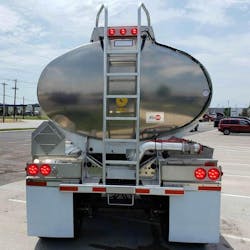The Federal Motor Carrier Safety Administration on June 28 granted four more exemptions for Intellistop’s pulsating brake lamp module—after approving Gemini Motor Transport’s request May 10—and provisionally renewed Groendyke Transport’s amber brake-activated pulsating lamp exemption for six months.
The newly granted exemptions for Brent Higgins Trucking, DJS Fundraising, JM Bozeman Enterprises, and Meiborg Brothers all have the same restrictions included in Gemini’s five-year exemption, limiting them to installing the Intellistop module in no more than 25% of power units and trailers the first year and no more than 50% the second year while maintaining an equal-sized control group.
Encore Building Products and Polytech Plastic Molding submitted Intellistop exemption applications at the same time as the other five companies but have not yet received decisions from FMCSA.
“After the Gemini Motor Transport exemption was granted, we hoped that FMCSA would grant the other six motor carriers exemption requests, but nothing with FMCSA is ever guaranteed, especially with respect to safety issues,” Michelle Hanby, Intellistop president, told Bulk Transporter. “We are thrilled that the exemptions are moving in the right direction. It’s just ironic that FMCSA wants endless amounts of data, yet they restrict the use of Intellistop to such a small number.
“If you want more data, you should equip more trailers.”
See also: Gemini wins first Intellistop exemption
The four new exemptions to section 393.25(e) of the Federal Motor Vehicle Safety Regulations—which include temporary limited exemptions to the requirements in 49 CFR 393.11(a) and 393.25(c)—run through June 28, 2029, and include extensive safety notification and reporting requirements. The Intellistop module “pulses” the required rear clearance, identification, and brake lamps from a lower-level lighting intensity to a higher-level lighting intensity four times in 2 seconds when the brakes are applied, then returns the lights to a steady-burning state while the brakes remain engaged.
Safety-focused operations
FMCSA notes in its new decisions it considered the safety records of the four motor-carrier applicants—who run a combined 427 vehicles—and found all four maintain out-of-service rates that are below the national average of 21.4%, with DJS’s rate of 0% “well below the national average.”
DJS also boasts 0% rates on driver and hazardous materials OOS incidents.
The agency also acknowledged in its rulings that nearly all commentors, including the American Trucking Associations and the National Truck Equipment Association, support the exemptions as a way to curtail rear-end crashes, and that 37 states, including California, currently allow brake lamps to flash.
See also: Intellistop exemptions flood federal register
“FMCSA and [the National Highway Traffic Safety Administration] NHTSA claim to be concerned with conformity and potential confusion with pulsing brake lights, but are they really?” questioned Hanby. “It’s interesting because FMCSA is acknowledging in the grant document that commenters note that 37 states currently allow brake lamps to flash, and in their analysis, they don’t deny that statement.
“Neither FMCSA nor NHTSA have taken steps through DOT funding mechanisms to force states to adopt verbatim the federal regulations on brake lamp operation, specifically noting that California has allowed flashing brake lamp technology since 1984.
“So what is their actual goal?”
Groendyke exemption renewal
Groendyke secured the first pulsating brake lamp exemption, which allowed the installation of amber brake-activated pulsating lamps on the rear of its trailers—in addition to the steady-burning brake lamps required by the FMCSRs—on April 26, 2019. The exemption expired April 26, so FMCSA renewed it through Oct. 26—unless it’s revoked earlier. The agency also is accepting new comments through July 29.
See also: FMCSA grants Groendyke exemption
Data Groendyke collected between January 2015 and July 2017 demonstrated that its 632 tank trailers equipped with both the auxiliary amber brake-activated pulsating lamp and red steady-burning brake lamps were involved in 33.7% fewer rear-end collisions compared to those equipped only with red steady-burning brake lamps, FMCSA noted in its original decision. Groendyke also analyzed whether the presence of auxiliary amber brake-activated pulsating lamps improved outcomes during slowing or stopping at railroad crossings and found that the trailers equipped with pulsating lamps were not involved in any rear-end collisions at railroad crossings during the same period.
In its new decision, the agency reported Groendyke had equipped 93% of its 1,440 trailers with auxiliary brake-activated pulsating lamps as of 2023. “Following this widespread implementation, Groendyke reported a notable reduction in rear-end accidents since 2018,” FMCSA stated. “Based on these findings, Groendyke reached the following conclusions: (1) The Groendyke Brake Warning Device Campaign results indicated that the pulsating lamps, in addition to steady-burning brake lamps, did not lead to confusion or distraction among following drivers; and (2) the data shows a direct correlation between the utilization of auxiliary brake-activated pulsating lamps and a decrease in rear-end accidents, indicating the efficacy of auxiliary pulsating brake lamps in enhancing visibility and reducing accidents.”
FMCSA added it will revoke the exemption if Groendyke’s drivers and/or commercial motor vehicles fail to comply with the terms and conditions, the exemption results in a lower level of safety than previously maintained, or continuation of the exemption isn’t consistent with the goals and objectives of applicable regulations.
“If evidence of insufficient safety is not provided, FMCSA anticipates granting a full five-year exemption when the provisional exemption expires,” the agency said.











